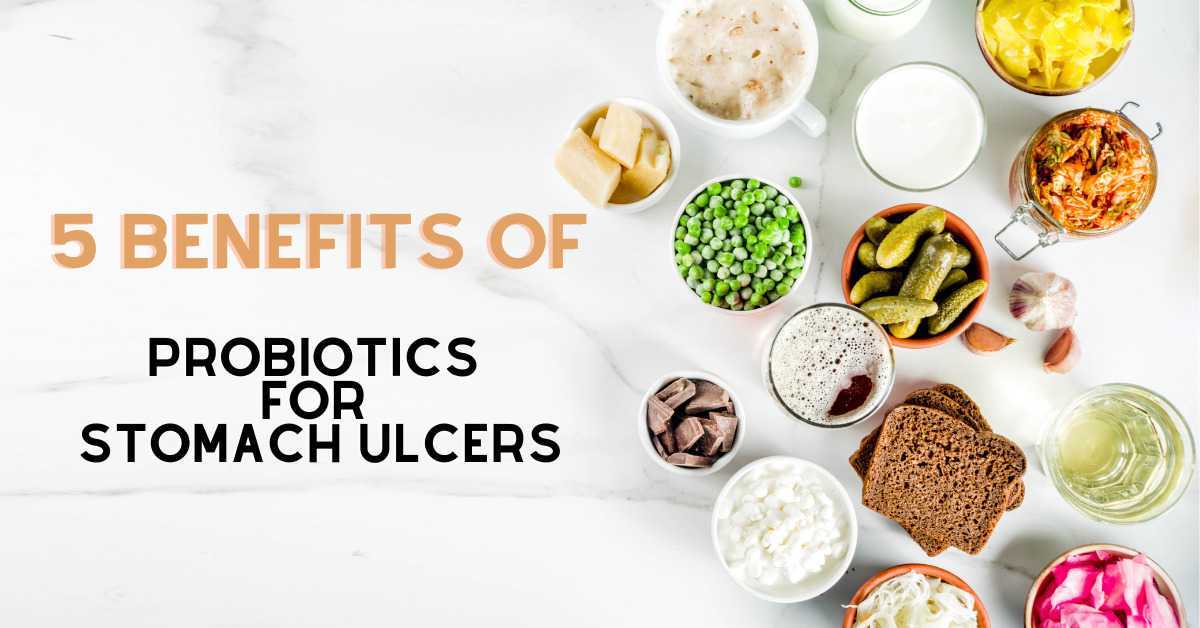When it comes to probiotics, there are many different strains that offer a variety of benefits. While some strains are good for gut health, others can help improve immune function. But, are probiotics good for stomach ulcer? Let’s find out in this health blog.
One of the most prevalent and deadly chronic illnesses of the upper gastrointestinal tract is stomach or gastric ulcer. According to data, they affect 2.4 percent of the Western population and may affect up to 6.1 percent of Asian people.
Our stomachs produce gastric acid naturally to break down and digest food. This acid is usually harmless and does not affect the stomach itself. However, there are certain things that can negatively affect the stomach’s defense against this acid.
When the stomach can no longer protect itself from this gastric acid it causes the stomach lining to become damaged which leads to the formation of ulcers. These are sores that develop in the lining of the stomach.
Causes of Stomach Ulcer:
So, what causes the stomach defense against the gastric ulcer to weaken? The main cause of this is usually a bacterial infection. However, they can be caused by certain medications and unhealthy life choices.
1. H. pylori Infections
The most common cause of stomach ulcers is an infection caused by H. pylori. This bacteria enters your body and attacks the stomach lining.
Once the bacteria have caused enough damage, acid can pass through the lining, resulting in ulcers. These can cause bleeding, infections, or prevent food from passing through your digestive tract.
H. pylori can be acquired through food, water, or utensils. It is more widespread in nations or communities where there is a shortage of clean water or effective sewage infrastructure.
You can potentially contract the bacterium by coming into touch with infected people’s saliva or other bodily fluids.
2. Certain Medications
Stomach ulcers can also be caused as a result of taking too many medications like NSAIDs (non-steroidal anti-inflammatory drugs). For example:
- ibuprofen
- aspirin
- naproxen
- diclofenac
These medicines are mostly prescribed for high fever, pain, or swelling and don’t have any side effects but if you take them for too long they might cause stomach ulcers.
3. Unhealthy Lifestyle
An unhealthy lifestyle is one that includes eating spicy, fried, or junk food, no physical activity, smoking, alcohol, or stress. If you have any of these habits they might be the reason for your ulcers.
Also, read about the Treatment of Diarrhea with Probiotics
Treatment of Stomach Ulcers:
Depending upon the cause, the following can be the treatment for stomach ulcers:
- Antibiotics
- Proton Pump Inhibitors (PPIs)
- H2-receptor antagonists
- Antacids and alginates
- Including Probiotics
What are Probiotics?
Probiotics are live microorganisms that can provide health benefits when consumed. They are found in fermented foods like yogurt and sauerkraut, as well as supplements.
The most common probiotic strains are Lactobacillus and Bifidobacterium. These strains have been shown to promote gut health, improve digestion, and boost immunity.
So, Are Probiotics Good for Stomach Ulcer?
According to research, the Potential role of probiotics in the management of gastric ulcers:
“Probiotics are not only effective against gastric ulcers induced by acetic acid, ethanol or stress but also play important roles in the prevention or treatment of ulcers induced by NSAIDs, such as aspirin or indomethacin.”


1. Probiotics Protect from Bacteria Causing Ulcers:
As explained above, H. pylori are the most common cause of stomach ulcers. The good news is that probiotics can reduce the number of H. pylori bacteria present in your stomach.
When the number of bacteria is reduced it automatically helps decrease the time required to heal and improve symptoms of stomach ulcers
Studies have also found that eating yogurt or products that have probiotics such as Lactobacillus and Bifidobacterium reduces the growth of H. pylori.
2. Improve Inflammation caused by NSAIDs
The results of research conducted on Probiotic lactobacilli suggest that taking probiotic supplementation orally can reduce the inflammation caused by NSAIDs.
Probiotics increase antimicrobial activity in the GI tract and help the lining of the stomach heal and restore its function so it can protect itself from pathogens.
3. Reduce Symptoms of Stomach Ulcers
Probiotics have a calming effect on the digestive tract and can reduce the symptoms associated with stomach ulcers like heartburn, ingestion, diarrhea stomach pain, and weight loss.
4. Restore Good and Bad Bacteria Balance
Probiotics are also known as good bacteria and help restore the imbalance of bacteria caused in your stomach by the bacteria or drugs. When this balance is restored your gut starts functioning better automatically.
5. Healthy Food Choice
All foods that contain probiotics are healthy food choices and are safe to eat for most people except for maybe those with lactose intolerance.
By adding these foods to your diet you can combat any infections and keep your digestive and immune systems healthy.
Consult a Gastroenterologist!
So, are probiotics good for stomach ulcer? Definitely, foods that contain probiotics or probiotic supplements are great for gastric health.
However, they should only be taken after consulting with a doctor so you have a proper diagnosis and know what is the cause of your stomach discomfort.
A Gastroenterologist is a stomach doctor that can advise you on the best treatment for stomach ulcers and other digestive issues.
Can’t Find the App?
| Android | IOS |
|---|---|
  |
  |
FAQs
Which probiotic is best for ulcers?
Lactobacillus and Bifidobacterium are the best probiotics for ulcers according to scientists. They help suppress the growth of H. pylori, improve the balance of bacteria in the gut, and also reduce inflammation caused by drugs like NSAIDs.
What is the fastest way to cure a stomach ulcer?
There can be different treatments for stomach ulcers depending upon their cause. If your ulcer has been caused by H. pylori the fastest way to cure it might be antibacterial drugs.
How do you heal your stomach lining?
You can heal your stomach lining by taking probiotic-rich foods or supplements, high-fiber foods, not using NSAIDs, avoiding spicy, fatty, and junk food, and controlling your stress levels.

